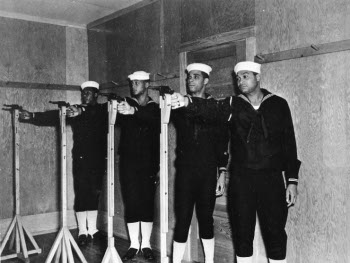![]() The Pacific War Online Encyclopedia
The Pacific War Online Encyclopedia
|
| Previous: Mili | Table of Contents | Next: Militia |

National Archives #80-G-294878
Military police
were soldiers who were trained, equipped, and organized to perform
police duty in combat zones or in areas under military law. In areas where civilian courts and police were
operative, the jurisdiction of U.S.
and Commonwealth
military
police was limited to military personnel in uniform. Their function was
largely to maintain order among troops on leave. Military police had
full jurisdiction in military facilities and in occupied territories
that were under martial law. The Navy had shore patrols that performed
the same functions as military police for Navy personnel and
facilities. Curiously, a considerable number of U.S. Navy shore
patrolmen were African-Americans.
The Japanese military police, or Kempeitai,
theoretically had similar restrictions on their jurisdiction. However,
they had power to enforce draft and "anti-defeatist" laws, and they
operated in Japan with relatively few restrictions. The corresponding Navy force was the Tokkeitai.
In forward areas, a major role of military police was directing military traffic over lines of communication.
Use of military police for civilian law enforcement in the United
States was restricted by the Posse Comitatus Act of 1878, which
prohibited any use of regular Army troops for law enforcement within the United
States without express authorization by a provision of the Constitution
or an act of Congress. However, following the attack on Pearl Harbor,
considerable pressure was put on the Army to assign large numbers of
military police to protect defense industries, an activity that fell
under national defense rather than law enforcement.The Army had planned to raise 54 military police battalions for internal security in the event of war, but the
actual number peaked at 89 in late 1942. The Army disliked this
diversion of resources from what it viewed as its offensive mission
overseas and much preferred leaving guard duty to the civil
authorities. A compromise was reached under which guard battalions were
raised that were nominally civilian, but were under Army control. These
formed a militia to take the place of the National Guard, which had been federalized and incorporated into the Army of the United States prior to the attack on Pearl Harbor.
References
Conn, Engelman, and Fairchild (1961; accessed 2012-11-10)
The Pacific War Online Encyclopedia © 2008, 2012 by Kent G. Budge. Index